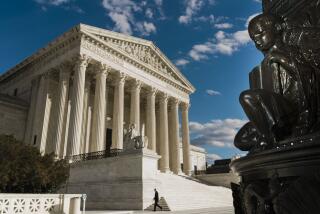U.S. Won’t Fight Pornography Conviction : Supreme Court: U.S. solicitor general had failed to defend prosecution. In bid to end controversy, Atty. Gen. Reno publicly overrules his position.
- Share via
WASHINGTON — In an effort to remove her department from an embarrassing legal flap over child pornography, U.S. Atty. Gen. Janet Reno told the Supreme Court Thursday that the Clinton Administration no longer will side with a Pennsylvania man who was prosecuted for purchasing movies of scantily clad young girls.
Instead, Reno said, the government will enforce a strict definition of child pornography which outlaws not only photos of nude children but also provocatively posed depictions of minors wearing underwear or bathing suits.
According to Justice Department officials, her legal brief filed Thursday marked the first time in 24 years that a U.S. attorney general had publicly overruled a position taken by the solicitor general, who normally speaks for the government before the high court.
“This is an issue upon which reasonable people, applying the law in good faith, can and have disagreed,” Reno said. Her department will seek to punish child pornographers “to the maximum extent allowed by the Constitution,” she said.
Last year Solicitor General Drew S. Days III surprised the Supreme Court and outraged conservative activists when he announced that he would not seek to uphold the government’s successful prosecution in a test case involving borderline child pornography.
The conviction had been won by prosecutors for the George Bush Administration, who brought the charges before a jury in a conservative district in central Pennsylvania.
In 1991, Stephen A. Knox had purchased three sexually oriented videos from a Las Vegas company, but rather than prosecute its owners in Nevada for selling pornography, the Bush Administration brought federal charges against the Pennsylvania man for buying the videos.
Knox was found guilty, sentenced to five years in prison and his conviction was upheld by lower courts. In an appeal to the Supreme Court, lawyers for Knox argued that, if the law made it a crime to buy photos of scantily clad girls, the child models displayed “in newspapers, magazines, clothing catalogues and art exhibits” could be deemed pornography.
The justices agreed to review the Knox case but, to their surprise, Days said that he would not defend the conviction.
Because the child models were clothed and were not “lasciviously engaging in sexual conduct,” the videos did not violate the 1977 anti-child pornography law, Days maintained. In angry protest, conservative groups such as “Enough is Enough” and the American Family Assn. sent messages by the thousands to Congress and to the White House. By a 100-0 vote, the Senate passed a resolution condemning the Justice Department’s stand.
Knox’s appeal was returned to the lower courts, which rebuffed the Days position and upheld the far-reaching definition of child pornography.
Last month, the Knox case again came to the high court, requiring the Justice Department to respond.
This time, in a brief signed personally by Reno, the department said that Knox was properly convicted. The law makes illegal “all lascivious exhibitions of the genitals of children,” regardless of whether the children are nude or wearing snug-fitting outfits, Reno said.
But the case is not over. The high court could still agree to hear Knox’s claim that the law is so “vague” as to be unconstitutional.
Though no mention was made of the Republicans’ resounding victory in Tuesday’s elections, one anti-pornography activist said that Reno had read the election returns.
“It’s a definite reflection of the realignment of powers . . . and a portent of things to come,” said John McMickle, a lawyer for the National Law Center for Children and Families.
But Carl Stern, Reno’s chief spokesman, said that the election did not affect the outcome. “This brief did not get written between Tuesday and Thursday,” he said.
Thursday’s announcement was not the first signal that the Administration would reverse its initial position in the Knox case. Late last year, President Clinton ordered Reno’s department to “aggressively attack the scourge of child pornography,” to seek new laws if necessary and to review the Pennsylvania case.
An attorney general last publicly overruled a solicitor general in 1970 when John N. Mitchell disagreed with Solicitor General Erwin Griswold and sent a brief to the high court defending a conviction in a draft registration case.
More to Read
Get the L.A. Times Politics newsletter
Deeply reported insights into legislation, politics and policy from Sacramento, Washington and beyond. In your inbox twice per week.
You may occasionally receive promotional content from the Los Angeles Times.











